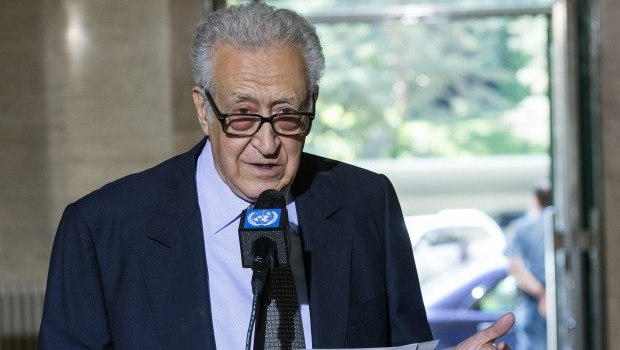
The UN joint special representative for Syria, Lakhdar Brahimi, briefs the media after a meeting with the Russian deputy foreign ministers Mikhail Bogdanov and Gennady Gatilov and US under-secretary of state for political affairs Wendy Sherman, to find a political solution to the crisis in Syria, at the European headquarters of the United Nations, in Geneva, Switzerland on Wednesday, June 5, 2013. (AP Photo/Keystone, Salvatore Di Nolfi)
London, Asharq Al-Awsat—Peace talks on the Syrian crisis are to be pushed back a month, according to the UN and Arab League envoy on the Syrian crisis, Lakhdar Brahimi.
Speaking after a meeting with US and Russian officials in Geneva yesterday, Brahimi told reporters: “There is still a lot of work to do to bring a conference about. For this reason, we have come to the conclusion today that it will not be possible to hold this conference in June.”
Diplomats now hope to organize the conference, dubbed Geneva II, for July. Planning for the conference, originally proposed by the US and Russia, has been plagued by uncertainty and disagreements over who will be invited to attend.
Brahimi admitted that the inability to convene the conference while the fighting in Syria continues was “embarrassing,” but placed the blame for the delay on the two sides in Syria, which he said were “not ready.”
The Syrian opposition in particular has been split over the issue of attending the conference and its willingness to negotiate with the government.
Brahimi said: “Until the opposition is ready, all we can do is wait…. Obviously, the conference cannot take place without them.”
The Syrian government has agreed in principle to attend the conference, although President Bashar Al-Assad has expressed skepticism about its chances of success in interviews with the media.
At the international level, states have also been divided over Iran’s attendance at the conference, which has been opposed by the US, France and Saudi Arabia, but backed by Russia.
Within Syria, the after-effects of the fall of the town of Qusayr, which government forces backed by Hezbollah fighters from Lebanon captured yesterday, continues to reverberate.
White House spokesman Jay Carney condemned Hezbollah’s role in the fighting in Syria, saying yesterday that the Lebanese militia and Iran had become Assad’s “partners in tyranny.”
“It is clear that the regime is unable to contest the opposition’s control of a place like Qusayr on their own, and that is why they are dependent on Hezbollah and Iran to do their work for them,” he added.
Worries that the conflict will spill over into neighboring states are growing following a number of recent border incidents.
Another rocket attack on Lebanon originating in Syrian territory was reported on Wednesday, with 11 rockets falling in and around the Lebanese city of Baalbek. No fatalities were reported.
On Thursday, the UN and Israel confirmed that Syrian rebels and government forces had clashed on the Syrian–Israeli border, near the occupied Golan Heights, and the Israeli military said that the Syrian Army had occupied a border post at Quinetra, usually manned by Austrian UN peacekeepers, after it was seized by rebels.
Concerns about the use of chemical weapons in the fighting in Syria are also growing. Although both the government and the opposition have accused the other of using chemical weapons on the battlefield, this week the French government said it had proof that the Syrian government had used sarin nerve gas in its battle with the rebels.
French foreign minister Laurent Fabius told a television interviewer on Wednesday that the French government had obtained three samples from Syria that had tested positive for the presence of the agent, and that there was “no doubt” the Syrian government was responsible for its use.
The evidence had been passed to the UN, he said. The head of the UN’s task force investigating the claims, Swedish scientist Ake Sellstrom, reacted cautiously to the claims and said more evidence was needed.
A statement from the UN said: “Mr. Sellstrom cautions that the validity of the information is not ensured in the absence of convincing evidence of the chain-of-custody of the data collected.”
